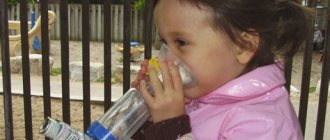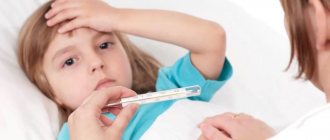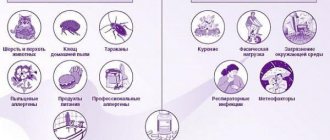Causes of cough in infants
There are many reasons for a baby to cough. The most common are:
- ARVI. In almost 90% of cases, cough in infants is the first sign of an incipient respiratory disease. During the daytime, the cough is mild, but in the evening and at night the symptom intensifies.
- Inflammation in the upper respiratory tract. A dry and persistent cough appears. It is very painful for a child.
- Dry indoor air. Because of it, a sore throat occurs, causing a cough. Installing a humidifier will help solve the problem.
- Otitis media or inflammation of the middle ear. The cough is a reflex. When pressing on the ear tragus, the child becomes restless, capricious, and cries.
- Entry of a foreign body. Life-threatening situation for a child. You need to tilt the baby's head forward and immediately call an ambulance.
- Polluted air outdoors or indoors. The baby's immature lungs react sharply to outside odors. Smoking and excessive gas pollution can trigger an allergic reaction in an infant.
Depending on the cause of the cough, the nature of the cough itself varies. For colds, the most common types of cough are dry and wet. A dry cough develops at the very beginning of the disease and is characterized by insufficient sputum production. Gradually it can turn into a wet cough.
How to treat a cough without fever in a 4 month old baby
An important point in relieving a baby of a cough is to create comfortable conditions for him, which consist, first of all, of moist and cool air.
Before starting drug treatment, you can relieve your cough by doing the following:
- thorough cleaning of the premises;
- humidifying the air in the room;
- reducing the temperature in the room;
- removal of carpets, wool blankets, animals;
- walks in the fresh air;
- special exercises and massage.
How do cough medications work?
To treat different types of cough, three groups of drugs with different active ingredients are used:
- Antitussives. Suppress cough. They are used during dry paroxysmal severe cough, whooping cough in order to alleviate the child’s condition. The active ingredients of such drugs are: sodium butamirate, glaucine hydrochloride, oxeladin.
- Mucolytics. They dilute mucus, reduce its elasticity and viscosity. Prescribed for dry, non-productive cough (with sputum difficult to separate), usually in combination with expectorants. Active ingredients: ambroxol, carbocisteine, bromhexine.
- Expectorants. They are prescribed for a wet cough in a child to facilitate the separation of sputum by increasing its quantity and accelerating its movement through the respiratory tract. As a rule, extracts of medicinal plants are used. Babies may experience allergic reactions to some types of herbs, so expectorants should be used with caution and under the supervision of a doctor.
Important! It is prohibited to independently combine antitussive drugs with expectorants and mucolytics. If there is an excessive accumulation of sputum and there is no cough, pneumonia can quickly develop.
What medications can and cannot be given to a child for a cough?
Those drugs that are available only in tablet form are prohibited for use in early childhood. For example:
- glaucine hydrochloride (Glauvent tablets);
- prenoxdiazine (“Libexin”).
A safe and acceptable form for children is drops and syrups with a low concentration of the active substance. Typically, drops and syrups for infants are diluted in water, tea or juice.
Some syrups cannot be used until two years of age or older, for example, the antitussive drug “Bronholitin”, “Gerbion” syrup for dry and wet coughs, “Erespal” syrup. Until two years of age, antitussive drugs containing narcotic substances: codeine and dextromethorphan are contraindicated for use.
Is it possible to give a child under one year of age Mukaltin cough tablets?
The tablets are intended for adults and older children. However, pediatricians, despite the restriction in the instructions for up to a year, consider it possible to give some tablets based on extracts of medicinal herbs to babies earlier.
Such tablets include “Mukaltin”, which contains marshmallow extract. The daily dose for a child under one year of age should not exceed two tablets. At one time, half a tablet is given, previously dissolved in a tablespoon of boiled water.
What can you give a child from two months to a year for a dry cough?
Antitussives
Drops "Codelac NEO" (Russia). Active ingredient: butamirate. For children from two months, 10 drops 4 times a day.
Analogues:
- drops "Panatus" (Slovenia);
- drops "Sinekod" (Switzerland).
Stoptussin drops (Czech Republic, Israel). Active ingredient: sodium butamirate in combination with guaifenesin. Children weighing less than 7 kg are given 8 drops 3-4 times a day orally, children weighing 7-12 kg 9 drops 3-4 times a day orally.
What can you give to a child from two months to a year for a wet cough?
Expectorants
- Syrup "Bronchipret" 50 ml (Germany). Ingredients: thyme herb extract, ivy herb extract. Children from 3 months to 12 months: 10-16 drops 3 times a day.
- Syrup “Licorice Root” (Russia). Based on licorice root extract. Children under two years old: 1-2 drops three times a day.
- Dry cough medicine for children (Russia). Based on dry plant extracts. Dissolve the contents of the package in 1 tbsp. l. boiled water. Give 15-20 drops to children under one year of age.
- Ammonia-anise drops (Russia). Active ingredients: anise oil, ammonia solution. Children under one year old: 1-2 drops three to four times a day.
- Syrup "Bronchicum S" (Germany). Based on thyme herb extract. For a child from 6 months to 12 years - 1/2 teaspoon (2.5 ml) 2 times a day.
- Syrup "Prospan" (Germany). Based on ivy leaf extract. Approved for use by infants from birth. 2.5 ml of syrup twice a day is recommended.
Important! Children under two years of age should take medications in the form of syrups and cough drops under the strict supervision of a doctor. The list of drugs is provided for informational purposes. You cannot prescribe medications to newborns yourself, since some children are allergic to the components of syrups.
Cough in a child - advice from a pediatrician to parents
Cough in a 4 month old child, how to treat without fever
Cough is one of the symptoms that can accompany inflammatory or infectious diseases. It often occurs in children under one year of age, since their respiratory organs are still imperfect. What to do if a child has a cough for 4 months, how to treat it without fever - this will be discussed in the article.
What kind of cough does a 4 month old baby have?
To start treating your baby, you need to understand the reason that causes cough in a 4-month-old child. Here are the following types of cough:
- Physiological - such a completely normal cough is not accompanied by fever, the child eats well and sleeps normally.
- Allergic - attacks occur in a certain room and under certain conditions, once you remove the source of the allergy, for example, woolen carpets, animals, indoor flowers, how does it go.
- If a foreign body enters the respiratory tract, the cough is strained, paroxysmal, and emergency assistance cannot be avoided.
- Dry - this type can accompany a cold or inflammatory disease, it is characterized by viscous sputum, which is difficult to separate, a strained cough, prolonged, and can occur at night during sleep.
- Wet - sputum comes out well, characteristic of the end of the disease.
Both general recommendations and special procedures and medications will help cure a cough.
How to treat a cough without fever in a 4 month old baby
An important point in relieving a baby of a cough is to create comfortable conditions for him, which consist, first of all, of moist and cool air.
Before starting drug treatment, you can relieve your cough by doing the following:
- thorough cleaning of the premises;
- humidifying the air in the room;
- reducing the temperature in the room;
- removal of carpets, wool blankets, animals;
- walks in the fresh air;
- special exercises and massage.
All of the above will significantly ease coughing attacks. After this, you can treat a cough without fever with medication. Currently, the pharmacy chain has drugs that can be given to children up to one year old. Most often they come in the form of syrups or drops.
If a child has a cough for 4 months, the pediatrician will tell you how to treat it without fever. Drugs with the following effects are usually prescribed:
- mucolytic, they dilute sputum;
- expectorants, they facilitate the discharge of sputum;
- calming, they relieve spasms and reduce attacks.
Modern drugs can be produced in combined form.
In addition to taking the medicine orally, infants aged 4 months can be treated for cough using inhalation. To do this, it is convenient to use special nebulizer devices.
Inhalations for coughing in children aged 4 months
Regardless of body temperature, steam inhalations should not be given to children aged 4 months. A good result in the treatment of cough in children of this age is achieved by inhalation of saline solution, which is done using a nebulizer.
These devices effectively help in the treatment of inflammatory processes in both the upper and lower respiratory tracts. Breaking medicinal substances into microscopic particles, the device delivers them to the mucous membranes in the very accumulation of sputum.
The procedure can be performed twice a day, for 3-5 minutes, for five days. Inhalations are carried out in normal breathing mode. To increase the therapeutic effect, saline solution for inhalation can be mixed in a 1 to 1 ratio with medications:
- Lazolvan;
- ambrobene;
- fluimucil.
Another advantage of inhalations is that, due to his age, the child is only able to take liquid products, so treating him at this age with tablets or powders is very inconvenient. This is where liquid syrups come to the rescue.
Cough syrups for a 4 month old baby
For cough, infants can be given the following medications:
- Ambroxol , syrup, is prescribed by a doctor for medical reasons, the medicine is given twice a day, 1/2 measuring spoon, treatment for more than 5 days is carried out only in agreement with the doctor.
- Ambrobene , syrup, is given twice a day, 1 ml per dose.
- Stoptussin , syrup for children, is given to children weighing over 7 kg, 8 drops 3-4 times a day.
It is important to note that the listed medications will work more effectively if the child is given some liquid after them. Of course, all drinks must be age appropriate.
At this age, the child can be given water; its amount per day during illness can be 100 ml. You can give your baby water in small portions between feedings. The drinking water temperature should be + 26 + 30 degrees.
If tea or carrot juice was introduced into the diet before the illness, then they can also be given to the baby.
When a child has a cough for 4 months, you can ask your doctor how to treat it without fever using traditional medicine methods. He will recommend safe and effective folk remedies.
How to treat a cough in a 4-month-old child using folk remedies
When treating an infant with folk remedies, it is important not to harm the baby. Sometimes even the thought of treating a baby with chemicals causes panic in parents. They believe that it is too early for their baby to take medicine. In this case, wraps and rubbing will help cope with the cough.
The simplest and safest remedy is camphor oil . It acts as a mild warming and distracting agent. A small amount, about 1 tbsp. l.
, camphor oil is heated to + 37 degrees and lightly rubbed into the chest and back. After which the child is wrapped in a dry diaper and covered with a blanket.
After 30 - 40 minutes, the baby needs to be changed into dry clothes and kept under the blanket for some more time.
A proven remedy for coughs that are difficult to treat is curd compress . For it you will need to take about 100 g of cottage cheese and 20 g of honey. The cottage cheese needs to be heated to +50 g in a water bath and honey added to it. Stir everything well and place on film.
Apply from the back and chest, cover with a diaper on top. Keep the mixture for 40 - 50 minutes. The procedure can be performed 2 times a day for 5-6 days. The curd compress is completely safe for the baby. Honey cake also has a mild effect on coughs.
It is not difficult to prepare it at home. It is enough to mix a few tablespoons of warm water with one spoon of honey and flour. From the resulting dough, form a cake to the size of the child’s back, cover it with a diaper and hold it for 40 - 50 minutes.
If the child falls asleep during the procedure, the cake can be removed after waking up.
What can you give a month old baby for a cough?
As a rule, cough in 1-month-old children is associated with an inflammatory disease of the respiratory tract. In such cases, medications for treatment are prescribed exclusively by a doctor. When prescribing mucolytic drugs, the severity of the cough reflex is taken into account, since in premature infants and those with neurological disorders, their use can cause stagnation of sputum in the bronchi and aggravate the course of the disease.
Some therapists recommend giving Stodal homeopathic cough syrup, which has no age restrictions. However, as practice shows, the effect of its use is questionable. Like all homeopathic remedies, this syrup has a very low concentration of active ingredients and is able to “treat” only due to the “placebo” effect, which is simply not yet possible at such an early age.
How to cure a cough in a child at three months old
How to treat a cough in a 3 month old child? At this age, you need to be especially careful about the child’s health. Therefore, treatment can begin only after examination and appointment by a specialist, and all the doctor’s instructions must be followed exactly.
Causes and symptoms of cough
Why does this symptom occur at 3 months? Most often it is a cold or allergy. However, there may be other reasons. At this age, the child has increased salivation. The baby may choke due to the large amount of liquid and begin to cough. The reasons for excessive salivation are as follows:
- Teething. Usually the process begins at 3 months.
- Saliva protects the oral cavity from germs, so when harmful microorganisms enter the mouth, salivation increases.
- The salivary glands are not yet fully formed, so they sometimes work excessively.
In addition, mucus may accumulate in a newborn overnight. It flows down the wall of the larynx, and this causes a cough reflex. Since a child at 3 months does not yet know how to blow his nose, this causes a cough. But that's absolutely normal.
In almost all cases, except for teething, the cough goes away quickly and is not accompanied by additional symptoms, that is, there is no fever or runny nose. If, in addition to coughing, other painful signs begin to bother you, it means that this is most likely a disease.
ARVI in young children is especially difficult. After all, at an early age, immunity has not yet been formed, the child cannot blow his nose yet, and this makes eating and breathing difficult. Babies become lethargic and moody. Colds manifest themselves as follows:
- stuffy nose;
- weakness and malaise occur;
- watery discharge from the nose appears;
- temperature rises;
- Dry cough bothers me.
As for allergies, they can also manifest themselves as coughing. But unlike ARVI, in such a situation the fever is usually not a concern. A rash and itching appear. Itching may occur in the nose and throat. Even your eyes can itch. In addition, swelling of the eyelids and frequent sneezing may occur.
What to do from the first days of a cough in a baby
If a one-year-old child develops a cough that is not caused by physiology, you should immediately call a doctor. Self-prescribing medications is prohibited. What can a mother do in the first days of a child’s cough?
- Monitor the air temperature in the room. It should not be higher than +22C. It is necessary to regularly ventilate the apartment. If the cough is not accompanied by a fever, you can take your child for a walk outside.
- Humidify the indoor air using a humidifier with a hygrometer. Control the humidity level; it should be between 40 – 70%.
- It is enough to give the child something to drink. Breast milk, tea, compote, water will do.
- Change the position of the baby in the crib more often, or carry him in your arms.
- A 6-month-old child who has a cough with difficult sputum is recommended to have a drainage massage. The doctor will show you how to do the exercises.
- You can rub your baby's chest and feet with animal fat (for example, badger fat). Ointments containing camphor and menthol are prohibited for children under 2 years of age.
How to treat a cough in a 4 month old baby
You need to understand that coughing is a natural process aimed at clearing the respiratory tract of foreign bodies and mucus.
Most often, spasms in a 4-month-old child are associated with insufficient development of the respiratory system and peculiarities of the gastrointestinal tract (regurgitation of food).
But under certain conditions, the appearance of uncontrolled chest contractions should be a reason to seek qualified help. For example, if you suspect pneumonia or tuberculosis.
Common Causes of Breathing Problems
First of all, parents must exclude the possibility of a foreign body closing the respiratory lumen.
A 4-month-old child is already able to grab various objects, so the risk that the baby simply chokes is very high.
If chest spasms occur without fever or other manifestations of a pathological condition, then it is necessary to perform a drainage massage and, if necessary, call an ambulance.
Allergic cough
Another cause of cough without fever is considered to be an incorrect response of the immune system to external stimuli. A 4-month-old child actively explores the world, inhaling various smells and touching objects. Chest spasms can be caused by household chemicals, washing powder, and even the perfume used by mom or dad.
You can suspect an allergic cough based on the following signs:
- during a sharp exhalation, sputum does not come out;
- nasal congestion appeared;
- eyes become very watery, eyelids swell;
- A rash and redness appear on the skin.
In order for the baby to stop coughing, it is necessary to exclude the possibility of contact with the irritant. Doctors recommend ventilating the room, increasing humidity, removing indoor plants and animals, and testing bedding for dust mites.
First teeth
The source of cough in a 4-month-old child can be the process of teething. According to statistics, gum inflammation occurs in every 3rd child. In this case, treatment is not required; you just need to wait until the bone tissue stops interfering with the baby.
It is important to be able to distinguish between a pathological cough caused by an infection and spasms that occur due to saliva getting into the throat.
How does your baby react to teething?
- copious amounts of saliva;
- increased body temperature;
- There is no wheezing in the chest when coughing.
Many mothers advise paying attention to the child’s mouth. Inflamed gums force the baby to constantly scratch them, so he puts toys in his mouth and is capricious during feedings.
Infection or virus
The most dangerous condition is when a child at 4 months learns for the first time to fight acute respiratory viral infections and acute respiratory infections. Most often, the infection or virus is brought by parents on their hands or clothes. It is quite difficult to avoid infection, since the “little man’s” immunity does not yet know how to correctly recognize pathogenic microorganisms.
You can understand that a cough is due to damage to the body by pathogenic microorganisms by the following accompanying symptoms:
- green or yellow sputum;
- the child has problems with bowel movements (diarrhea);
- body temperature rises sharply or, conversely, decreases;
- When listening to the chest, wheezing can be distinguished.
Such signs of the disease require immediate medical attention. There is no need to be embarrassed to call a pediatrician at home. Often, timely assistance helps to avoid dangerous complications.
How to treat a cough
Pediatricians advise avoiding taking pharmacological drugs. Often, spasms in a 4-month-old baby can be calmed without medication. First of all, you need to allow the baby to move. The vertical position of the body and frequent turns of the body contribute to the accelerated discharge of sputum and a speedy recovery.
It's a good idea to drink plenty of fluids. A dry cough does not bring relief, so it is important to thin the mucus in the airways. Herbal tea, juice diluted with water or compote are allowed.
Drainage massage is very effective. You can treat a cough in a 4-month-old child by patting him on the back. The baby should be placed on his knees so that his head is slightly lower than his shoulders. Often such simple manipulations alleviate the condition of a small patient.
The use of medications must be approved by a pediatrician. Doctors prescribe pharmacotherapy when changing the regimen and humidifying the air do not give the desired result. Sometimes treatment combines several different medications, for example, during the day the baby is given syrups to ease coughing, and at night a sedative is recommended for normal sleep.
Popular cough medications for a 4-month-old baby:
- syrups "Gedelix", "Prospan";
- plant complexes “Solutan”, “Pertussin”;
- breast mixtures in tea bags.
If the spasms are caused by an allergic reaction, the patient can be treated with Fenistil and Suprastin drops. The main thing is to correctly determine the dosage and obtain approval for the use of such drugs from a pediatrician.
Source: https://stop-kashel.ru/chem-lechit-kashel-u-rebenka-4-mesyatsa/
What can you give your child if he has a severe cough?
- It is necessary to determine the cause of the cough (bronchitis, pneumonia, laryngotracheitis).
- Indicate the type of cough (wet, dry, with fever).
- Increase the volume of fluid consumed.
- Use antitussive drugs in drops “Panatus”, “Sinekod” (strictly as prescribed by a doctor) for a severe dry cough. Prescribed from 2 months of age, 10 drops - 2 r. per day.
- For a wet, strong cough, expectorants and mucolytic drugs are used (Lazolvan, Ambroxol, Ambrobene, Thermopsis, Flavamed). Age restrictions and recommended doses are described above.
- The chest is rubbed with warming substances (badger fat).
What antibiotics can be given to infants for a cough with fever?
The cough itself is not an indication for antibiotic therapy. If it is accompanied by an increase in temperature, the bacterial nature of the disease is assumed. In such cases, the doctor prescribes antibiotics.
Infants are prescribed injectable antibiotics, as well as drugs in the form of a suspension. Most antibiotic suspensions are contraindicated in children under 6 months of age. Amoxacillin, Amoxiclav, and Sumamed are considered relatively safe. The dosage is prescribed depending on the complexity of the infectious disease and the child’s weight.
Important! Tetracycline antibiotics are strictly prohibited for young children. They have a destructive effect on tooth enamel; children’s teeth initially grow weak.
Causes of snot and cough
In infants, snot and cough are constant companions of acute respiratory infections. They develop against the background of the penetration of various viruses into the body. Agents penetrate the cell and multiply by absorbing its resources. Most often, bacteria begin to actively behave in the tract of babies.
It is not always necessary to treat coughs in young children. In some cases, this pathology is temporary and goes away on its own.
With rhinitis, a baby experiences severe inflammation of the nasal mucosa. Against the background of this symptom, swelling and severe vasodilation develop. At the same time, the baby's snot flows. Parents will also be able to detect the accumulation of large amounts of mucus. Additionally, it should be noted that rhinitis can be viral or bacterial in nature.
As the disease develops, the baby begins to suffer from the inability to breathe properly. The situation is dangerous because it can lead to sleep disturbances and loss of appetite. In this case, the baby simply refuses to suckle.
When a child coughs, he can only breathe through his mouth. In this case, each breath is forced. Some babies also experience seizures. In this case, coughing in infants is a protective reaction of the body. However, they cause a lot of fears and concerns among mom and dad.
Coughing helps clear the respiratory tract. Thanks to it, the accumulated amount of mucus and harmful microorganisms is removed. This process also prevents the development of upper respiratory tract complications. However, for example, with whooping cough, the manifestation of a symptom causes severe discomfort to the child. That is why parents must do everything to prevent the situation from getting worse.
If a child coughs, harmful viruses and bacteria are removed from his body. To improve your overall health, you should use medications. However, in this case, the risk of harming the body that has not yet become stronger increases. In medical practice, cough is divided into several groups depending on the nature of the symptom:
- with a productive cough, the child constantly produces a certain amount of sputum;
- dry cough is considered a non-productive symptom.
In a newborn, ARVI symptoms continue for up to 14 days
The incubation period is influenced by several factors. The presence of infectious agents can aggravate the situation. These microorganisms have a number of characteristics and negatively affect the overall well-being of the baby.
With the parainfluenza virus, the risk of developing laryngeal stenosis increases in a child. If the situation is not stopped in time, bronchitis can become chronic. The disease is dangerous if it begins to develop from an early age. Additionally, with pathology, the child develops snot and an increase in body temperature. Analysis of the clinical picture does not always show which virus or infection causes the disease to develop.










